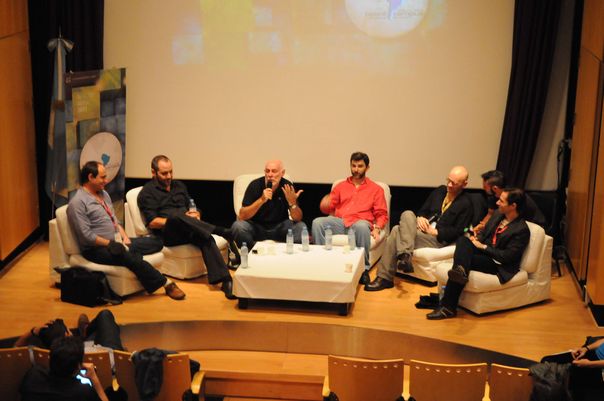Time to read, time to think
Griselda Soriano of the Talent Press Buenos Aires 2011 reports on a panel that raises some questions about the present and future of film criticism.

The panel "New forms of film criticism in the digital age" at the Talent Campus Buenos Aires.
"New forms of film criticism in the digital age": that was the self-explanatory title of the panel discussion held at Talent Campus Buenos Aires. This is a fairly recurrent issue in discussions concerning film criticism, but the answers are never easy. Diego Batlle, Scott Foundas, Robert Koehler, Roger Alan Koza, Diego Lerer and Quentin participated in this debate, which focused on the many paradoxes arising out of the use of the internet for film-related writing - which we refer to in this ambiguous way, since not every discussion on the web amounts to "criticism". Actually, everything seems to have two perspectives in the virtual world.
The internet provides an escape from the restrictions of mass media: limited space, rigid editorial guidelines, and deadlines. On the web, space is – at least, in theory – endless, and the limits – time and style – are chosen by the writer. Digital media seem to enjoy almost absolute freedom. But how does the need for immediate satisfaction combine with solid and well-founded writing and the need to sift through first impressions? Are limits negative? Can’t they, to a certain extent, feed creativity?
How about the almost unrestricted access to texts and films? There is no doubt that exposure to other kinds of writing, close and distant, is rewarding, and that the amount of materials circulating on the Internet is blissful to film lovers. But does quantity make a better critic? If we consume non-stop, when do we stop to think?
Another point that was discussed was the word "democratization", so widely used when talking about the digital era. While film criticism used to be exclusive of a few people, it is now available to everyone. How do we find our way around so many voices? How can we differentiate? How much room is left for today’s critics, whose "authority" has somehow been lost? And how democratic is that democracy? Have old hierarchies really disappeared? Aren’t "qualified" voices and revered names still more popular?
When it comes to digital media, there are more questions than answers, because we are dealing with a living and evolving phenomenon. Neither critics coming from paper nor writers initiated in the virtual world can predict the outcome. Uncertainty is scary for some people, while the frenzy of change provokes blind faith in others. The only certainty is that film criticism has been shaken up: its role, place and demand are no longer obvious. However, since destabilization obliges us to reflect, this process is leading, or should lead, critics to sooner or later rethink their position in relation to films, readers and writing itself. It may be uncomfortable, but questioning oneself is a good exercise. No definitive conclusions can be reached, but the debate is still open.


301 Moved Permanently